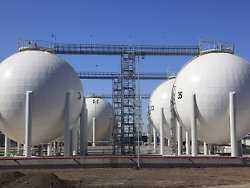Other EU countries hesitate
Baltic states stop importing gas from Russia
4/3/2022 2:18 am
During the EU summit in Brussels, the heads of government of several EU countries could not bring themselves to impose an energy embargo on Russia. Latvia, Estonia and Lithuania are now leading by example. According to their own statements, they turn off the Kremlin’s gas supply.
The Baltic States have stopped importing natural gas from Russia. “Russian natural gas has not flowed to Latvia, Estonia and Lithuania since April 1,” Uldis Bariss, head of the Latvian natural gas storage operator Conexus Baltic Grid, told Latvian radio on Saturday. Lithuanian President Gitanas Nauseda called on the rest of the EU to follow suit on Twitter: “If we can do it, the rest of Europe can do it too!”
Years ago, his country made decisions “that enable us today to end energy relations with the aggressor without pain,” added Nauseda. According to Bariss, the Baltic market is currently supplied by gas reserves stored underground in Latvia.
Against the background of the Ukraine war and Western sanctions, Russian President Vladimir Putin announced on Thursday that ruble accounts with the Russian Gazprom Bank were now required for gas deliveries to EU countries. While the USA has already stopped Russian oil and gas imports, the EU states have kept them so far. In 2021, the EU received around 40 percent of its gas supplies from Russia.
Stopping gas imports poses a risk for Germany
Several experts warn of economic consequences if Germany should decide to stop gas imports from Russia. According to the Institute for Macroeconomics and Business Cycle Research, an abrupt interruption of energy supplies from Russia, whether due to a German embargo or a Russian supply freeze, would cause a deep recession in Germany this year. In this case, GDP would shrink significantly more than in the risk scenario.
“Basically, an energy embargo would of course be a political decision that involves numerous considerations. However, we would like to point out that the economic and social consequences would most likely be serious and economic policy must be ready to react accordingly,” said Sebastian Dullien , the scientific director of the IMK.
